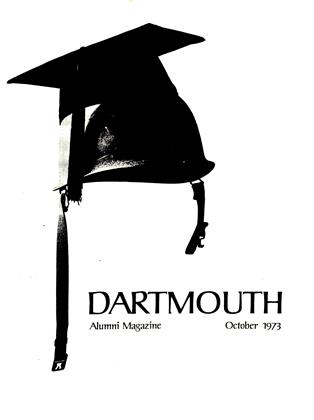The giants of the age have familiar names and faces. But we know little about them as people. Only a privileged few have an opportunity to know them as friends.
Although Robert Frost celebrated his 50th birthday before I was born, during one of the formative years of my life we were friends. While there was never the intimacy one has with his contemporaries, we casually and frankly exchanged ideas, prejudices and enthusiasms, and in a unique way bridged the gap of years and fame.
Frost was a "Lecturer in the Library" at Dartmouth in 1947-1948, and was available in the afternoons to talk with the students he found interesting....
We met shortly after lunch, and usually broke up when he suggested a walk. In spring and autumn we would walk to Allen's Drug Store - a distance of about four blocks - to check the blackboard where they posted Boston baseball scores each inning. A rabid sports fan, Frost enjoyed talking about athletes and athletics. Sometimes he seemed more at ease discussing sports than poetry.
Frost always encouraged me to talk about my war experiences. All the nitty-gritty little aspects of war fascinated him. Fie couldn't hear enough about bayonet drills, KP, my resentment of the U.S. nonfraternization policy which forbade Gls from associating with German girls, or the operation of the cigarette black market in France. He never seemed really interested in discussing books, but his eyes sparkled and he asked probing questions when I talked about significant events in my life.
Once while chatting about the obligation of parents to their children he told me about a friend of his eldest daughter who was tried for murder after electrocuting a retarded child in a bathtub. He was convinced that his daughter had lied on the witness stand to help her friend. What would my position be as a judge, juror, parent or friend, if I were involved in a similar situation? Would I perjure myself to help a friend? When loyalty runs into conflict with truth, what then? He posed the question, but never told me which road to take.
I once asked his views about two well-known modern French poets, and he replied that he didn't know who they were. When I admitted I wasn't very fluent in French, he accused me of putting on airs. He didn't think any poetry was worth a damn in translation, and since he was only able to read Latin and English fluently he was unfamiliar with poets who wrote in other languages.
Once he confided that he had always had a secret desire to be a professional baseball player. Sometime before World War I he and Cornelius Weygandt, a Penn professor and early Frost admirer, arranged to have Tris Speaker, the Boston Red Sox pitcher, test their nerve by pitching to them while they wore fielders' gloves instead of catchers' mitts.
One of his Vermont neighbors was William Hazlett Upson, one of the best paid, but least known fiction writers. Each year Upson sold half a dozen or so short stories to the Saturday Evening Post about a tractor salesman named Alexander Botts. Although they appealed to different literary audiences, Frost admired Upson as a fellow craftsman whose skills commanded top dollar in the literary marketplace. One day he asked what I thought of Upson. I ridiculed the Botts stories and the people to whom they were appealing. He said I was a snob.
Although he did some writing almost every day, sometimes it took him years, or even decades, to. complete a poem. Almost all his published poems were rewritten and polished many times. He had in his files poems he had originally written in 1910, but in 1948 he still considered them too unpolished to publish.
Robert Frost inscribed two of his books to me. One says, "For his promises in the art," and the other, "With great expectations." They serve as reminders that I have promises to keep.
Mr. Obermayer is editor of the Northern Virginia Sun, in which this article originally appeared.
 View Full Issue
View Full Issue
More From This Issue
-
 Feature
FeatureCITIZEN SOLDIERS
October 1973 By LAURENCE I. RADWAY -
 Feature
FeatureONE HUNDRED MASTER DRAWINGS
October 1973 By ROBERT B. GRAHAM '40 -
 Feature
FeaturePeregrine Summer
October 1973 By James T. Harris '72 -
 Feature
FeatureArcheological "Amateur"
October 1973 -
 Feature
FeaturePort Professional
October 1973 By M.B.R. -
 Article
ArticleBig Green Teams
October 1973 By JACK DEGANGE
Article
-
 Article
ArticleDo you Support the offer of the Rockefeller Center and Thayer School To Bring John Sununu to Dartmouth as a visiting fellow?
APRIL 1992 -
 Article
ArticleDr. Wheelock's Journal
December 1995 By "E. Wheelock" -
 Article
ArticleLectures
June 1929 By Albert I. Dickerson -
 Article
ArticleBASKETBALL
APRIL 1964 By DAVE ORR '57 -
 Article
ArticleHanover Browsing
October 1956 By HERBERT F. WEST '22 -
 Article
ArticleTHIRTY YEARS OF ALUMNI REPRESENTATION ON THE BOARD OF TRUSTEES
May, 1924 By James Fairbanks Colby '72

